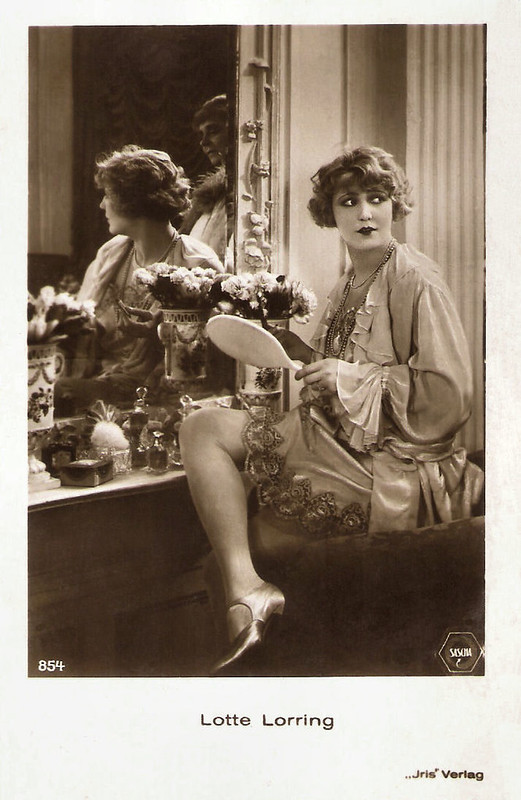German actress and singer Lotte Lorring (1893-1939) started as an operetta singer in provincial theatres. Between 1920 and 1935, she played both in support and leading roles in German silent and sound films. Incidentally she appeared in international productions.
![Lotte Lorring]()
Austrian postcard by Iris Verlag, no. 854. Photo: Sascha.
Interesting Directors
Lotte Lorring was born in Berlin, Germany in 1893. First she worked in provincial theatres and she made a name for herself as an operetta singer. In 1919 she made her film debut in Sein letzter Trick/His Last Trick (Rolf Brunner, 1919) with Heinrich Peer and Ernst Pittschau. She then appeared in Der Meisterschuss/The Master Shot (Rolf Brunner, 1920) and Es bleibt in der Familie/It Runs in the Family (Gerhard Lamprecht, 1920), starring Paul Heidemann.
In France, she played in L’ouragan sur la montagne/The Hurricane on the Mountain (Julien Duvivier, 1921) and Le logis de l'horreur/The Sinister Guest (Julien Duvivier, 1921), in which she played the female lead. During the second half of the 1920s, she worked with interesting directors in films like Das graue Haus/The Gray House (Friedrich Feher, 1926) with Magda Sonja, Eine Dubarry von heute/A Modern Dubarry (Alexander Korda, 1926) starring Maria Corda, and Königin Luise.1. Teil: Die jungend der königin Luise/Queen Louise (Karl Grune, 1927).
Lorring co-starred opposite Harry Piel in the comedy Sein größter Bluff/The Big Bluff (Henrik Galeen, Harry Piel, 1927), and opposite Mady Christians in Fräulein Chauffeur/Miss Chauffeur (Jaap Speyer, 1928). In Austria, she appeared for Sascha-Film in Wem gehört meine Frau?/Whom belongs my wife? (Hans Otto, 1929), starring Fritz Kampers.
![Lotte Lorring]()
German postcard by Ross Verlag, no. 4762/1, 1929-1930. Photo: Becker & Maass, Berlin.
Paramount
Lotte Loring played the lead in her first sound film, Karriere/Career (Adolf Trotz, 1930) with Walter Rilla. For Paramount, she played in the German-language comedy Ich heirate meinen Mann/I'm marrying my husband (E.W. Emo, 1931), an alternate-language version of Her Wedding Night (Frank Tuttle, 1930).
In the first years of the sound era, she played in some ten films, but soon her roles became less frequent. She had substantial parts in Schwarzwaldmädel/Black Forest Girl (Georg Zoch,1933), and Johannisnacht/Midsummer Eve (Willy Reiber, 1934) starring Lil Dagover. Her final film was Leichte Kavallerie/Light Cavalry (Werner Hochbaum, 1935), starring Marika Rökk.
Four years later, Lotte Lorring died in her hometown Berlin in 1939. She was only 45.
![Lotte Lorring]()
German postcard by Margarinewerk Eidelstedt Gebr. Fauser GmbH, Holstein. Serie 1, Bild 12. Photo: Marcus.
Sources: Thomas Staedeli (Cyranos), Wikipedia (German), and IMDb.

Austrian postcard by Iris Verlag, no. 854. Photo: Sascha.
Interesting Directors
Lotte Lorring was born in Berlin, Germany in 1893. First she worked in provincial theatres and she made a name for herself as an operetta singer. In 1919 she made her film debut in Sein letzter Trick/His Last Trick (Rolf Brunner, 1919) with Heinrich Peer and Ernst Pittschau. She then appeared in Der Meisterschuss/The Master Shot (Rolf Brunner, 1920) and Es bleibt in der Familie/It Runs in the Family (Gerhard Lamprecht, 1920), starring Paul Heidemann.
In France, she played in L’ouragan sur la montagne/The Hurricane on the Mountain (Julien Duvivier, 1921) and Le logis de l'horreur/The Sinister Guest (Julien Duvivier, 1921), in which she played the female lead. During the second half of the 1920s, she worked with interesting directors in films like Das graue Haus/The Gray House (Friedrich Feher, 1926) with Magda Sonja, Eine Dubarry von heute/A Modern Dubarry (Alexander Korda, 1926) starring Maria Corda, and Königin Luise.1. Teil: Die jungend der königin Luise/Queen Louise (Karl Grune, 1927).
Lorring co-starred opposite Harry Piel in the comedy Sein größter Bluff/The Big Bluff (Henrik Galeen, Harry Piel, 1927), and opposite Mady Christians in Fräulein Chauffeur/Miss Chauffeur (Jaap Speyer, 1928). In Austria, she appeared for Sascha-Film in Wem gehört meine Frau?/Whom belongs my wife? (Hans Otto, 1929), starring Fritz Kampers.

German postcard by Ross Verlag, no. 4762/1, 1929-1930. Photo: Becker & Maass, Berlin.
Paramount
Lotte Loring played the lead in her first sound film, Karriere/Career (Adolf Trotz, 1930) with Walter Rilla. For Paramount, she played in the German-language comedy Ich heirate meinen Mann/I'm marrying my husband (E.W. Emo, 1931), an alternate-language version of Her Wedding Night (Frank Tuttle, 1930).
In the first years of the sound era, she played in some ten films, but soon her roles became less frequent. She had substantial parts in Schwarzwaldmädel/Black Forest Girl (Georg Zoch,1933), and Johannisnacht/Midsummer Eve (Willy Reiber, 1934) starring Lil Dagover. Her final film was Leichte Kavallerie/Light Cavalry (Werner Hochbaum, 1935), starring Marika Rökk.
Four years later, Lotte Lorring died in her hometown Berlin in 1939. She was only 45.

German postcard by Margarinewerk Eidelstedt Gebr. Fauser GmbH, Holstein. Serie 1, Bild 12. Photo: Marcus.
Sources: Thomas Staedeli (Cyranos), Wikipedia (German), and IMDb.